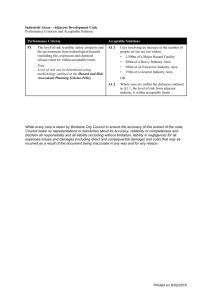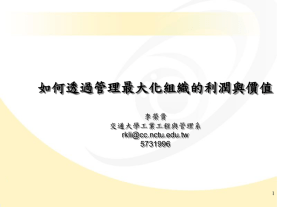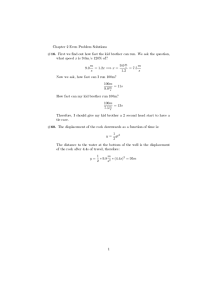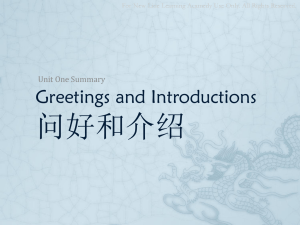11.307 Beijing Urban Design Studio MIT OpenCourseWare .
advertisement
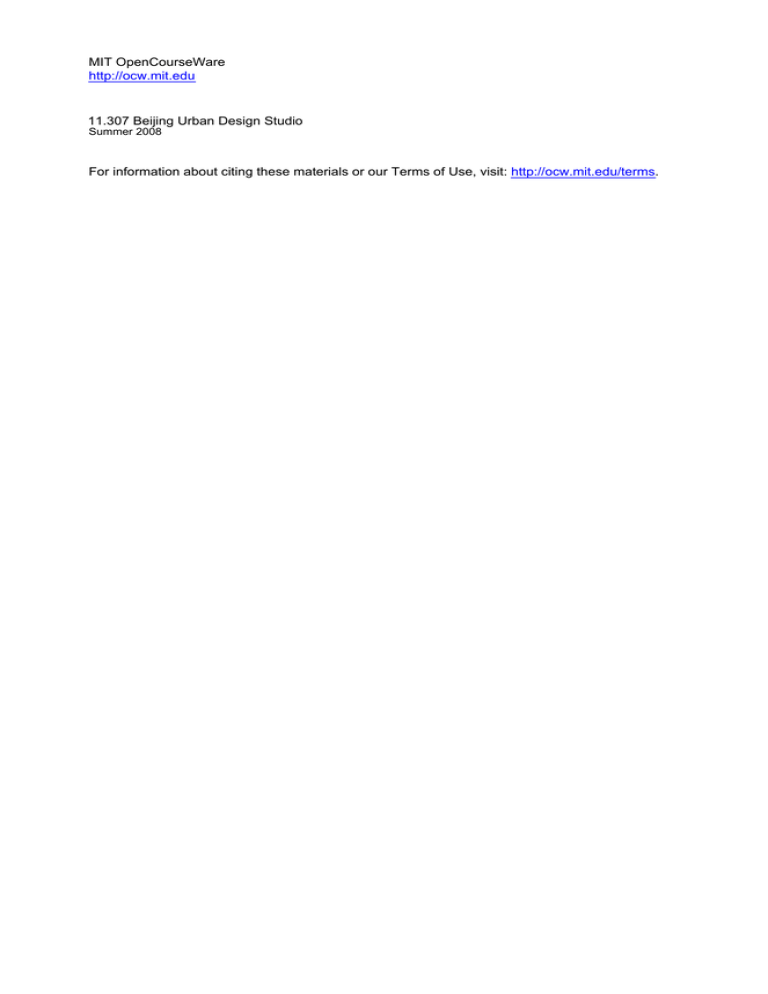
MIT OpenCourseWare http://ocw.mit.edu 11.307 Beijing Urban Design Studio Summer 2008 For information about citing these materials or our Terms of Use, visit: http://ocw.mit.edu/terms. ⦃๗ᵘᶊϟⱘৃব⏋ড়ԧ flexible moduling in an environmental framework concepts Viewing the environmental damage present on Shougang site as an opportunity rather than a hindrance to development, we have used the necessity of environmental reclamation to drive a new type of development. This new option for living in Beijing, allows not only the current residents who choose to remain on site, but also migrant workers, and environmentally conscious Beijingers the opportunity to live in a community committed to reclaiming both the environmental and social landscapes of the city. The proposed environmental activities at Shougang give all residents the opportunity to make a difference in their envi­ ronment. The modular expansion of housing provides smaller green spaces to all residents. In addition to providing income for Shougang, large-scale remediation efforts will also provide employment, income and training to migrant workers seeking to transition from a rural to an urban livelihood. The inclusivity of environmental action at Shougang will build a dynamic com­ emfalq$Yf\l`ak[YfZ]j]Û][l]\afl`]\]n]dghe]flkljYl]_q& =fnajgfe]flYdj]e]\aYlagfakl`]Újklh`Yk]g^kal]\]n]dgh­ ment, necessitating large industrial spaces. As the initial de­ velopment locations grow, these spaces are then subdivided to serve new functions. This gradual and adaptive programming allows the site to develop according to its needs over time. prototype for modular development 䰊↉ᓔথॳൟ phase 0 phase 1 phase 2 environmental laboratory The site will develop as a laboratory and campus for the re­ search and production of sustainable industries. The campus will provide vocational/technical training to both current resi­ dents and migrant workers. Additionally, it will provide integra­ tion support services to migrant workers, which would discour­ age the discrimination, manipulation and disenfranchisement that commonly occurs in the city modular framework 9Û]paZd]`gmkaf_lqhgdg_qoYk[j]Yl]\lg`]dhY[[geeg\Yl] the shifting population needs and facilitate phaseal growth. These typologies take into account the shifting programs of large industrial buildings, and aims to provide all residents with the opportunity to work in the emerging green industries onsite. ⏙ढᄺ-MIT࣫ҀජᏖ䆒䅵㘨ড়studio MIT-Tsinghua 2008 phase 4 phase 5 energy station e-industry rental housing housing commerical civic industry green housing industry 㛑䞣キ ⫳ᗕᎹϮ ߎ⾳ԣ᠓ ԣᅙ ଚϮ ݀݅ぎ䯈 ᎹϮ 㓓࣪ commercial education ὖᗉ ᇍѢ佪䩶ᴹ䇈ˈ⦄⢊ⱘ⦃๗⸈ണᰃথሩⱘᴎ䘛 㗠䴲䰏DŽ៥ӀᏠᳯ䗮䖛⦃๗ᮄᴹࡼϔ⾡ ᮄⱘᓔথᓣ˖ϔϾ⦃๗ঞ⼒Ӯ᱃㾖Ϟϡᮁ ᮄⱘ⼒ऎDŽ䰸њĀ㗕࣫ҀāˈࣙᣀᴹҎ ষҹঞ⦃ֱҎ࣫ⱘݙҀҎ䛑᳝ৃ㛑҆䑿ԧ 偠䖭ϔᮄⱘජᏖ᱃㾖DŽ ⦃๗ѻϮⱘᓔথӮЎ佪䩶എഄⱘ⌏⫳ݙҎӀᏺ ᴹḋⱘ㸠ЎᴎӮDŽϔᮍ䴶ˈᇚ⦃๗ᮄϢԣ ᅙᓔথⳌ㒧ড়ˈЎԣ᠋Ӏᏺᴹњᢹ᳝㓓ഄ ⱘᴎӮDŽϔᮍ䴶ˈ⦃๗ѻϮгৃҹЎ佪䩶ᦤ կ㒣⌢߽ⲞҹঞݡህϮᴎӮDŽℸˈ⦃๗ѻϮ 䖬㛑䗮䖛ᦤկᎹǃᬊܹঞᡔ㛑䆁ˈՓᴹ Ҏষདഄ㒣ग़⬅ݰᴥජᏖⱘ䕀ൟDŽℸˈ ᳝Ꮌࣙᆍᗻⱘ⦃๗ѻϮᇚӮЎ佪䩶߯䗴ϔ ϾࡼᗕЁⱘ⼒ऎˈ㗠ҹϞⱘᛇ⊩гӮᴹⱘ থሩ⬹Ёᕫࠄԧ⦄DŽ project principles phase 3 Ўњ㦋ᕫሎᑺⱘᎹϮ⫼ഄˈ⦃๗ᮄᰃഎഄ ᓔথⱘϔℹDŽ䱣ⴔϔ䰊↉ⱘ䗤⏤㤤ˈϔ ѯᎹϮぎ䯈ᇚӮ㹿ߦߚ៤㢹ᑆᮄⱘࡳ㛑ऎDŽ䖭 ḋߚ䰊↉᳝催䗖ᑨⱘᓔথᓣᦤկњᓔথϞ ϡᮁϢᯊׅ䖯ⱘৃ㛑ᗻDŽ phytoremediation techniques ỡ⠽ׂᡔᴃ Mechanics Hydroponically raised plants placed in contaminated water concentrate the metals in their roots and shoots X X X X Rhizofiltration X Contaminant migration via wind, rain, and groundwa­ ter prevented through plant­ ing X X Phytostabilization X X X X X Plants absorb elemental metals from the soil and bio­ logically convert them to gaseous metals and release them into the atmosphere X Phytovolatization Roots absorb contaminants and store them in above ground shoots X X X X Phytoextraction ᓔথॳ߭ ⦃๗ᅲ偠ᅸ എഄϞᇚᓔথϢ⦃๗ѻϮⳌ݇ⱘᅲ偠ᅸঞ ᄺˈЎৃᣕ㓁ѻϮⱘⷨおϢ⫳ѻ᳡ࡵDŽᦤկ 㘠Ϯᬭ㚆ⱘৠᯊˈᄺӮᇍԣ᠋ঞᴹҎষᦤ կᡔ㛑䆁DŽℸˈ䖭ϔ᷵ುгӮ䗮䖛ᦤᑇ ㄝ᳝དⱘѸ⌕ᴹЎᴹҎষ߯䗴ϔϾ㡃དⱘ៤ 䭓⦃๗DŽ ᭄Ḛᶊ Ўњᅝ㕂⌕ࡼҎষˈৠᯊ䖯എഄⱘ䰊↉ᗻথ ሩ䅵ߦˈ៥Ӏ䆒䅵њϔϾ᳝ৃবᗻⱘԣᅙॳ ൟDŽ䖭ϔॳൟҢൟᎹϮᓎㄥⱘৃবᗻߎথˈ ࡾ䅽᠔᳝ⱘԣ᠋䛑㛑খϢࠄ⦃๗ᎹϮ䖭ϔϡ ᮁ⫳䭓ⱘѻϮЁᴹDŽ ma xiaoying - marissa grace desmond - zhang ruoxi - keith case - kristina katich ⦃๗ᵘᶊϟⱘৃব⏋ড়ԧ flexible moduling in an environmental framework plans of northern area ࣫䚼ऎඳ㾘ߦ 250 m 50 m 250 m 250 m 500 m illustrative plan 㾘ߦ⼎ᛣ ⏙ढᄺ-MIT࣫ҀජᏖ䆒䅵㘨ড়studio MIT-Tsinghua 2008 50 m 500 m land use ⫼ഄ⼎ᛣ 50 m 500 m open space and circulation ᓔথぎ䯈ϢѸ䗮⼎ᛣ ma xiaoying - marissa grace desmond - zhang ruoxi - keith case - kristina katich ⦃๗ᵘᶊϟⱘৃব⏋ড়ԧ flexible moduling in an environmental framework modular growth ᭄࣪⫳䭓 reprogramming of existing structures ⦄᳝ᵘㄥ⠽ⱘ⫼߽ݡ 500m 1km 100m Large existing buildings with adaptable afl]jagjkhY[]Yj]j]k]jn]\lgÚjkl`gmk] soil remediation and related industries land use diagram ⫼ഄߚᵤ As soil remediation moves out of the major spaces, other industrial uses as well as migrant housing will move in provisionally as the rest of the site is developed into industrial and light commercial enterprises. phase 0 As the remediation activities move else­ where on the Shougang site, the remaining industrial volume can be broken up into smaller commercial and residential spaces while larger spaces will become civic and entertainment venues. 500m 1km 100m phase 1 500m 1km 100m phase 2 housing industry 500m 1km 100m civic phase 3 commercial green 500m 100m 1km 500m 1km 100m phase 4 500m 1km 100m phase 5 500m 100m ⏙ढᄺ-MIT࣫ҀජᏖ䆒䅵㘨ড়studio MIT-Tsinghua 2008 1km phase N ma xiaoying - marissa grace desmond - zhang ruoxi - keith case - kristina katich ⦃๗ᵘᶊϟⱘৃব⏋ড়ԧ flexible moduling in an environmental framework furnace repurposed as a living machine 催♝⫼߽ݡ䆒䅵ᑳ∈໘⧚キ section 催♝ࠪ䴶 plan 催♝਼䖍എഄ䆒䅵 section a ࠪ䴶D 10 50 GREEN BELT TROLLY LINE GREEN BELT EXISTING BUILDING RIVERSIDE PARK RIVER b a 100 10 50 FURNACE NUMBER THREE TEMPLE MOUNTAIN BIG HOT LAKE EAST/WEST AXIS RIVERBED RIVERSIDE PARK section b ࠪ䴶E 100 ⏙ढᄺ-MIT࣫ҀජᏖ䆒䅵㘨ড়studio MIT-Tsinghua 2008 ma xiaoying - marissa grace desmond - zhang ruoxi - keith case - kristina katich ⦃๗ᵘᶊϟⱘৃব⏋ড়ԧ flexible moduling in an environmental framework housing typologies ሙԣॳൟⷨお 1 5 10 1 5 10 1 5 10 1 5 10 Zmad\af_klqd]k\]n]dgh]\oal`Û]paZd]eg\md]dg_a[ ⏋ড়ৃবԧ䘏䕥ϟⱘᓎㄥ㉏ൟⷨお environmental industry mixed use housing ⏙ढᄺ-MIT࣫ҀජᏖ䆒䅵㘨ড়studio MIT-Tsinghua 2008 housing housing in repurposed structures business tower ma xiaoying - marissa grace desmond - zhang ruoxi - keith case - kristina katich
